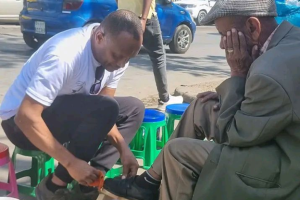
Kitaw Teklemariam was among those Ethiopians who once suffered severely from tuberculosis (TB) and stigma from the people around him which resulted in his loving wife and daughter leaving him because of the disease.
However, with the help of God and the treatment he received for several months, Kitaw is able to regain his health and now he is supporting other patients who are passing through the same challenge he had experienced.
When Kitaw`s health was affected by TB some years ago, he did not expect it to be such a serious disease. For that reason, he was taking traditional medicines that brought him no solution. However, after taking the proper examination at the health center, he realized that he was affected by TB and started taking proper medicines for about six consecutive months which still did not bring him change. When Kitaw consulted medical practitioners about his health situation and the medicines he had been taking for months did not make any progress, he was examined again; the result showed it was a Multi-Drug Resistant TB type that needed further treatment. Thus, he started taking various types of medicines and injections for about 18 months.
Luckily, he regained some of his strength but the medical result still showed a new variety of TB (Extensively Drug Resistant) was developed in his body. For this reason, he started further treatment for the 19consecutive months in Bishoftu Town and finally he got cured from the disease.
According to Kitaw, besides the actual pain most TB victims are experiencing, the stigma they experience from the people is the hardest to bear. This includes family members, spouses and friends. “Whenever I coughed, those who knew I was a victim of TB did not want to contact me freely. My wife, the mother of my beloved daughter, also left me thinking that I would not have any hope of recovering from the illness.”
The psychological, economic and physical challenge incurred by the disease affected not only the TB victims but also the whole family. This challenge is even serious among those TB recovered patients. Seeing this burden, Kitaew and his friends have founded a local NGO- Organic Health Service- to support those people affected by the bacteria and those who are recovered from the disease with major and minor physical injuries that may happen in the medication process.
Using the organization that Kitaw and his friends founded, several TB infected individuals and those who are recovered from the disease but still need psychological treatment and economical support are getting help.
According to Kitaw, besides the financial challenges at the national level, knowledge gap and absence of proper information among the society is one major factor that aggravates the transmission of the diseases. In this respect, the media, the government and other stakeholders are duty bound in creating awareness among the mass.
TB is world`s deadliest infectious disease. Due to the illness, a total of 1.3 million people die every year and 10.6 million people will be infected with TB.
Because of the infectious nature of the disease, one fourth of the world`s population is infected with Mycobacterium tuberculosis, which is a species of pathohgeneic bacteria in the family of Mycobacteriaceae and the causative agent of tuberculosis in humans. Here, in Ethiopia because of lack of awareness about the transmission of the disease, limitation in having proper equipment and medicine coupled with financial constraints to effectively treat the disease, hundreds and thousands of people are affected by the disease.
Presenting challenges and Ethiopia`s achievements in the area of TB, Head of National, TB, Leprosy and other Lung Disease within the Ministry of Health Taye Letta said that Ethiopia is among the 30 high TB and TB/HIV burden countries globally. Out of 100,000 people, 126 people will be infected by TB yearly. This indicates that hundreds and thousands of people will be vulnerable to TB. What is more, 21,000 people will die in Ethiopia because of TB.
In a field training, “Training Experience on Healthcare System Modernization and Digitization Program” organized by Addis Ababa University School of Journalism and Communication in collaboration with the U.S Embassy in Addis Ababa, Taye said that 17,500 community based health posts, 3,700 health centers and 353 hospitals are providing services to control and treat TB and leprosy.
Taye also indicated that drug resistant TB (MDR/RR-TB) prevalence is the other challenge facing the society. Out of the total population not less than 2,000 people are expected to be affected by drug resistant TB. “As a means to halt the spread of the disease, the Ministry of Health is working aggressively. USAID, which is one of the main stakeholders in the fight against TB, is supporting Ethiopia`s project in various ways. This includes projects such as Technical support through the implementation Partners (USAID Elimination TB project, GHSC-PSM, DHA) including TB Program supply chain, digitization and others.”
What is more, Taye said, the USAID has also financed directly the procurement of GeneXpert Machines which is a molecular diagnostic system, an advanced and versatile platform used for rapid and accurate testing of various infectious diseases.
The issue of TB should be the concern of every individual. Since the disease is transmittable by its nature, no one could boast about his/her health. He/she might contract the disease accidentally. For this very reason, everyone should join hands.
What is more, the contagious nature of the disease has also made the disease more dangerous for it will incur economic challenges for individuals infected by the disease as well as the families living with him/her.
According to Taye, international organizations like USAID in this regard are discharging responsibilities by providing necessary support. But, seeing the magnitude of the disease and its contagious nature, there is still a gap in areas of service provision.
As to him, several strategies and programs implemented by the government have brought positive impact and to decline the rate. This includes the “End TB Strategy” that is targeted to lower transmission and death rate. And the year 2015-2022 has seen a decline in TB mortality rate by 38.4 percent. This number has increased after 2022 because of conflict, war and other related factors.
However, Taye indicated that Ethiopia`s effort towards preventing TB cases between 2018-2022 was more than the expected target which was set by the UN High Level Meeting (UN HLM) where leaders have set targets to achieve goals.
Mentioning that Ethiopia`s case was in a better position in global standard he added that trends of TB treatment cases were improved between the years 2017-2023. TB treatment cases that were registered 60 percent in 2017 have increased to 92 percent by the year 2023. Four months of treatment coverage of regions for this fiscal year is more than 100 percent.
Regarding the distribution of the disease in states, Taye said, areas in the Sidama, Borena, Guji, Gedeo, South West, Gondar, Afar, Eastern Bale and Western Harerge are areas vulnerable to TB cases. Age group, which is found in the working group, is more vulnerable to TB cases. This is due to their mobility.
In his message, Taye urged the media to give more coverage to TB related issues by producing and disseminating TB awareness programs. He said, absence of proper information concerning TB is one reason for its transformation. This is especially true among the rural community. In this regard, proper informative reporting about the disease creates awareness among the society.
BY LEULSEGED WORKU
THE ETHIOPIAN HERALD THURSDAY 21 MARCH 2024





